- Despite Friday’s rally, investors are bracing for risk-off amid a persistent confluence of hazards
- Goldman Sachs, Bank of America advise increased caution
- Dollar bottoming out
While investors will continue monitoring upcoming economic data, including home sales and personal spending, what they’re really looking forward to is the Fed’s annual symposium at Jackson Hole which usually takes place in person, but because of rising COVID cases in the US and worldwide, will this year take place online. It begins at the end of the week.
This much-anticipated event could serve as a game changer for markets. If the US central bank reinforces the message that it is nearing an end to tapering by reducing bond purchases, as indicated in last week's FOMC minutes, a full blown selloff could result. On the other hand, if the Federal Reserve provides another erudite flip-flop, ultimately flagging it will continue to delay tightening, an additional rally could ensue. The Fed has gone back on its policy rhetoric before, so it wouldn’t entirely surprise us if they do so again.
Higher Daily Close Obscures Risk-Off Mood
As last week's trading came to a close, Friday’s dip-buying could, at first glance, suggest that investors remain willing to assume risk. All four major US indices—the S&P 500, Dow Jones, NASDAQ and Russell 2000—closed higher ahead of the weekend.
Though the future seems more uncertain than it has in quite some time, with the economy slowing amid the escalating Delta strain, coupled with the threat of a stimulus pullback, one would have expected the rising wall of investor worries would have easily pressured markets lower, but to date the S&P 500 Index has doubled in value since the infamous March 2020 lows.
However, deeper analysis of the performance of the broad benchmark's sectors on Friday reveals that possibly, something else is currently playing out. Utilities added 1.25% of value on the day, just 0.04% below Technology.
On a weekly basis, the S&P slumped 0.6%, though Utilities and Health Care outperformed, both gaining a little over 1.8%. Real Estate came in third, adding 0.6%.
Even from a monthly perspective, Utilities led the SPX's 2.75% rally. The defensive sector gained 6.75%, followed by Health Care, which rose 5.7%.
While equities finished the week looking strong, investors should take note: the only reason this occurred is that based on the evidence in the details, market participants were rotating out of risk and into defensive positions.
Additional signs that participants are becoming jittery about markets include Goldman Sachs nearly halving its forecast for Q3 US growth to 5.5% from 9%, and Bank of America increasing cash overweights to the highest since October 2020, while adding to its defensive positions.
Nevertheless, the S&P 500 remains in a medium-term uptrend...for now.
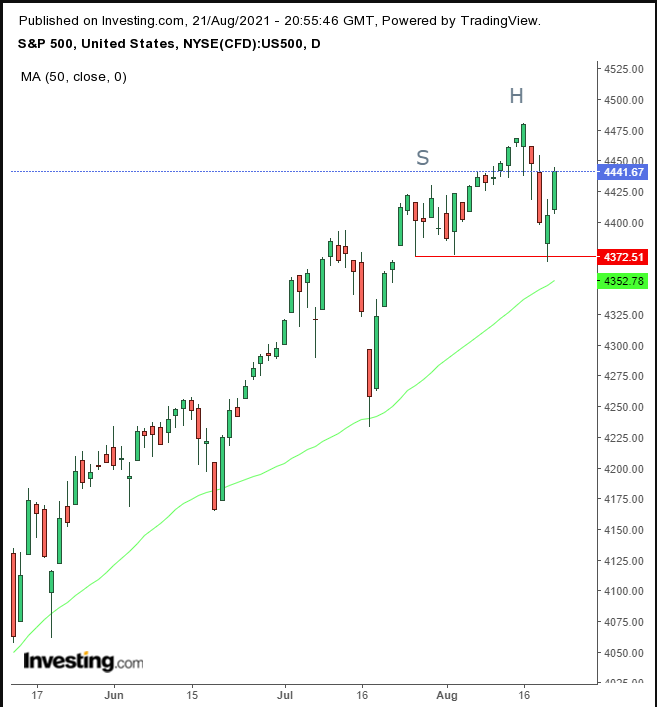
Still, the index is trendless in the short-term, having slipped lower than the late-July highs after its recent rally. Unless bulls can push the SPX to a new high, and if bears manage to then push it back below the 4,370 level, we might have a short-term top on our hands. This may or may not lead to a medium-term decline. Note too that the Advance-Decline line was flat on Thursday and Friday, demonstrating that despite the rally, there was no market breadth to support it.
A slowdown in China’s Industrial Production figures for July, released at the start of last week's trade, reinforced market pessimism over a global economic recovery. That, in turn, led to a selloff during the week of oil, copper and other commodities sensitive to economic cycles.
As well, it increased safe haven flows into Treasuries early in the week. While yields—including for the 10-year note—did rise on Friday, demonstrating that investors were letting go of some of their haven positions, rates are in clear downtrends.
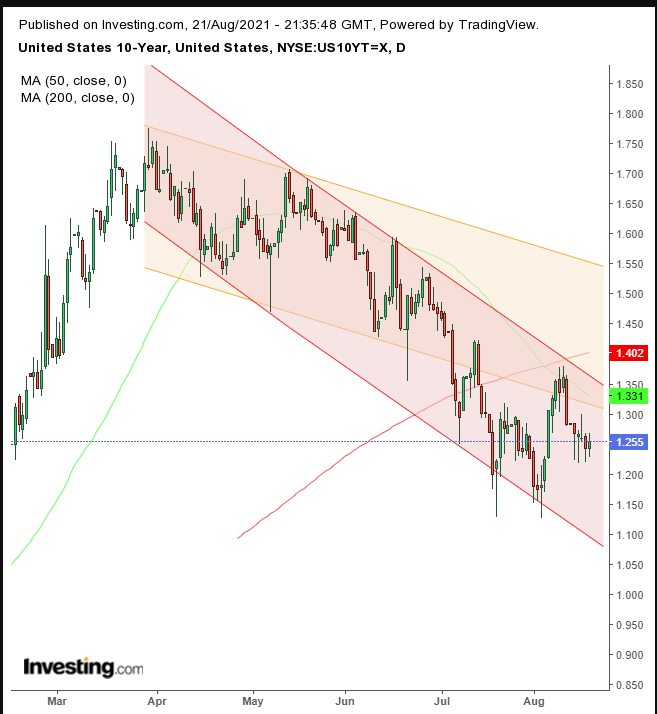
Yields have fallen from the top of the red falling channel, which coincided with the bottom of the previous, orange falling channel. The 50 DMA crossed below the 200 DMA in the very same spot, triggering the aptly named Death Cross, demonstrating that even broad, smoothed prices are weakening.
Another negative indicator for stocks is the safe haven dollar which climbed to a 9-month high last week.
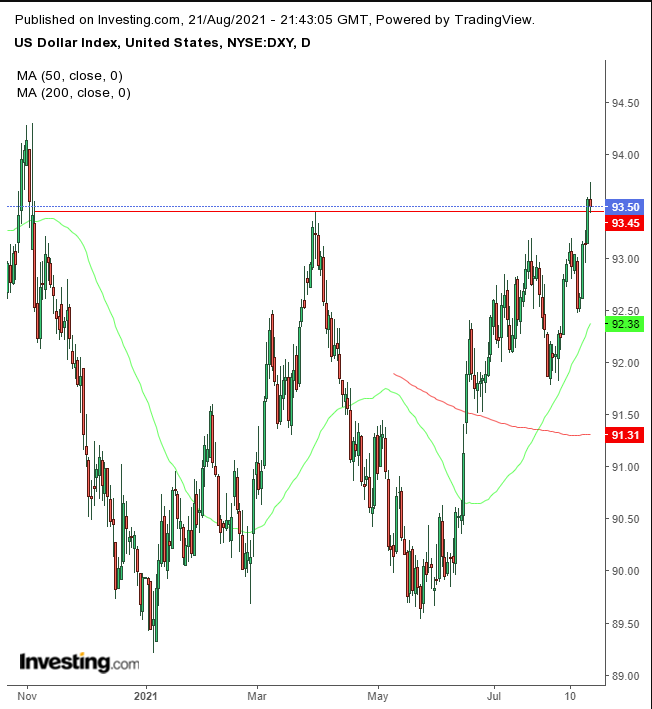
The greenback moved above the Mar. 31 peak, completing a double bottom. Be sure to put stop-loss filters in place to avoid getting caught in a bull trap.
Gold managed to eke out a gain despite dollar strength.
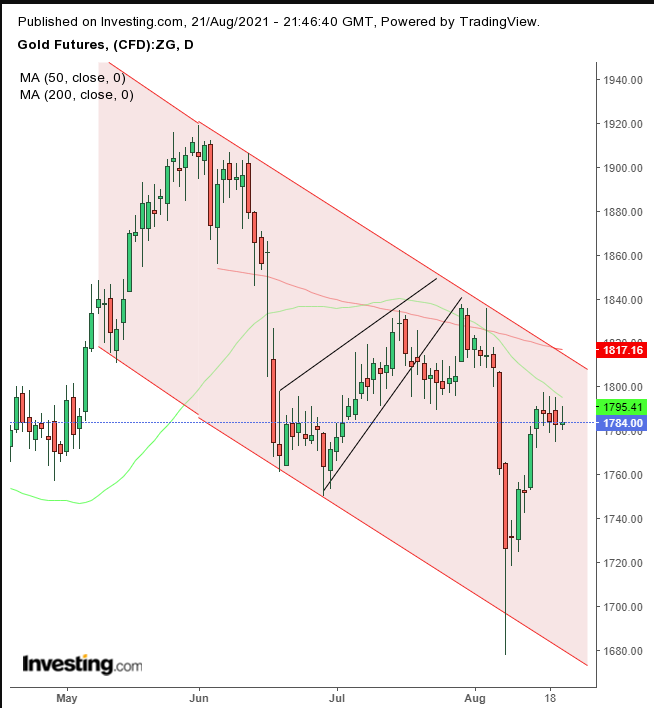
The precious metal found resistance by the 50 DMA, after the short-term MA crossed below the 200 DMA, triggering a Death Cross, lending resistance to the top of a falling channel.
Bitcoin fluctuated under $50,000 on Saturday, after a two-day rally.
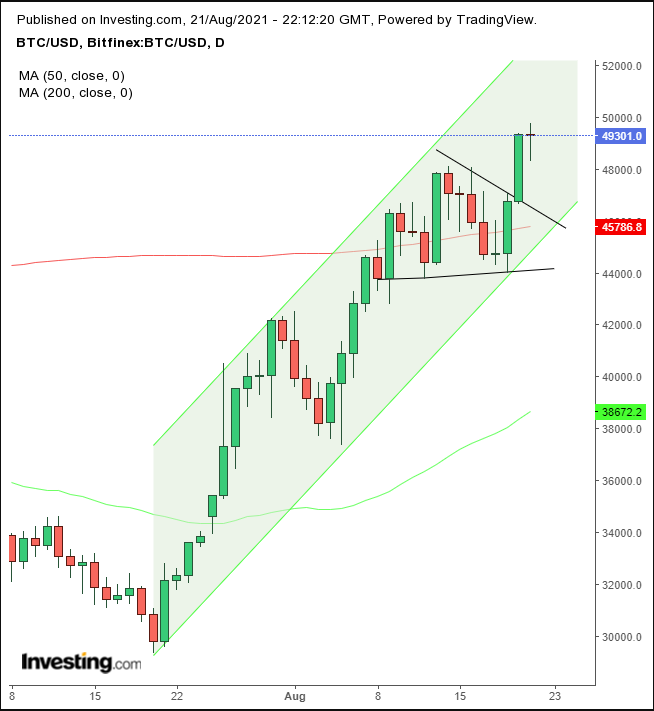
Saturday’s trading developed a high-wave candle which demonstrates a lack of leadership, as investors sought a catalyst for the cryptocurrency's next move. Such confusion may lead to a return-move to retest the bullish pennant, interwoven with the 200 DMA, within a rising channel.
Oil is set for a continued downtrend after a seven day straight decline, its sharpest weekly loss in nine months. As the virus keeps spreading, it's disrupting what was hoped would be an escalating, opening summer economy.
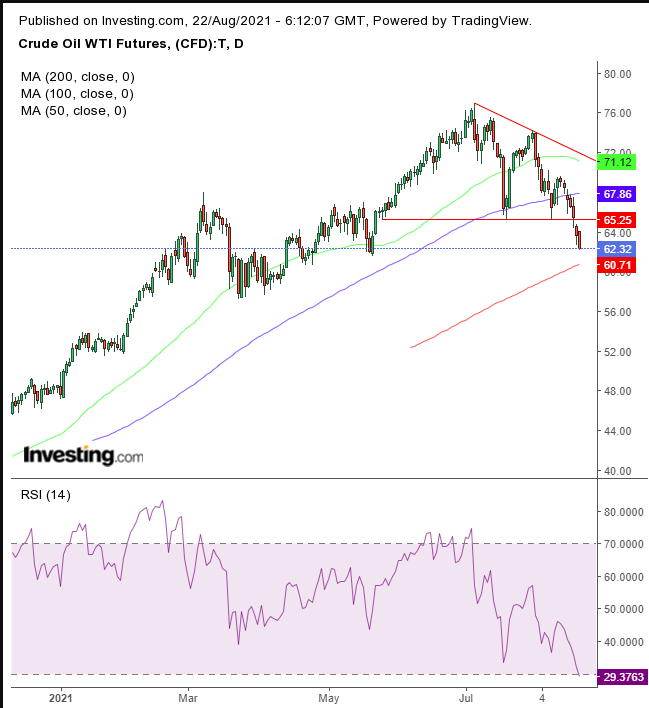
On Thursday, WTI completed a Descending Triangle, topping out its uptrend. As the price slumps, reaching its May lows and the 200 DMA—with the RSI falling to oversold conditions—it may find support sufficient to bounce back to retest the now presumed resistance at the $65-66 levels.
The Week Ahead
All times listed are EDT
Monday
3:30: Germany – Manufacturing PMI: to slip to 65.0 from 65.9.
4:40: UK – Manufacturing PMI: anticipated to come in at 59.5, lower than July's 60.4.
10:00: US – Existing Home Sales: forecast to fall to 5.81M from 5.86M.
Tuesday
2:00: Germany – GDP: expected to remain flat at 1.5% YoY.
10:00: US – New Home Sales: seen to rise to 690K from 676K.
Wednesday
4:00: Germany – Ifo Business Climate Index: likely edged down to 100.4 from 100.8.
8:30: US – Core Durable Goods Orders: predicted to hold steady at 0.5%.
10:30: US – Crude Oil Inventories: anticipated to surge to -1.055M from an upward revision of -3.234M.
Thursday
7:30: Eurozone – ECB Publishes Account of Monetary Policy Meeting
8:30: US – Initial Jobless Claims: foreseen to tick higher, to 350K from 348K.
21:30: Australia – Retail Sales: forecast to slump to -2.9% from -1.8% MoM.
Friday
8:30: US – Core PCE Price Index: to slip to 0.3% from 0.4% MoM; to rise to 3.6% from 3.5% YoY.
8:30: US – Personal Spending: expected to tumble to 0.3% in July, from 1.0% previously.
